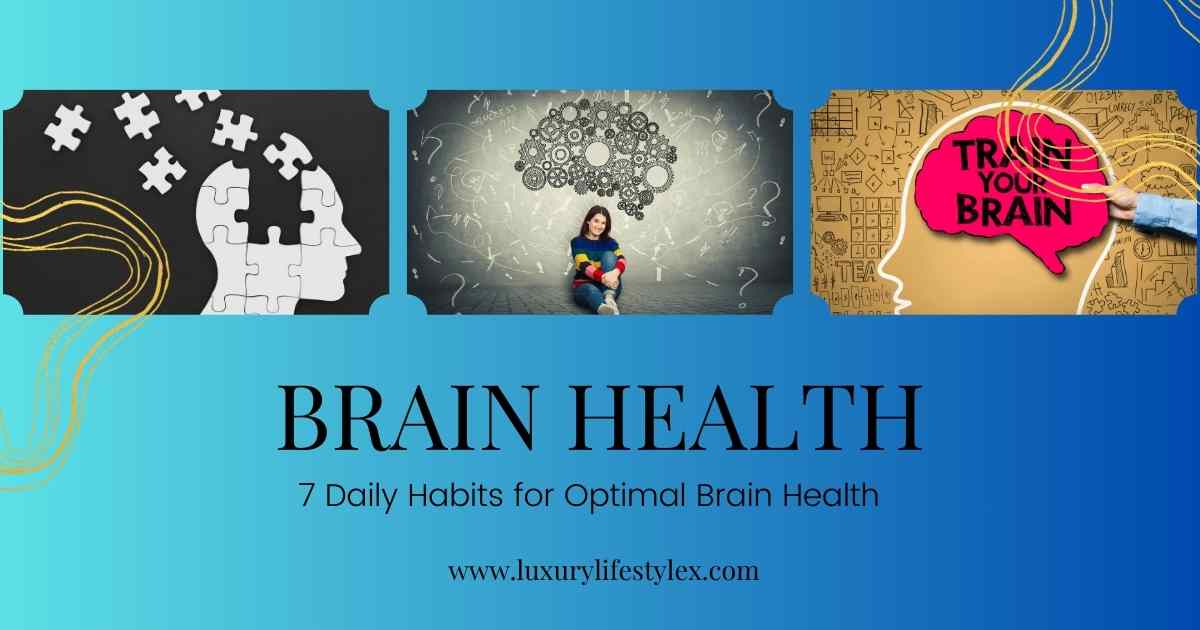Introduction
Maintaining good brain health is crucial for leading a long and fulfilling life. The brain, often called the control center of our bodies, plays a vital role in regulating our thoughts, emotions, and actions. Like other organs, the brain also requires proper care and attention to ensure optimal functioning. This article will delve into seven daily habits proven to enhance brain health and promote mental clarity. By incorporating these habits into our daily routine, we can take proactive steps towards nurturing our brains and improving our overall well-being.
1. Prioritize Quality Sleep
Getting enough high-quality sleep is one of the most critical habits for optimal brain health. During sleep, the brain undergoes essential processes that promote learning, memory consolidation, and overall cognitive function. Lack of sleep can impair attention, concentration, and problem-solving abilities.
Establish a consistent sleep schedule and create a relaxing bedtime routine to ensure a good night’s sleep. Avoid electronic devices before bed, as the blue light from screens can disrupt sleep patterns. Create a calm and comfortable sleep environment by keeping your bedroom dark, quiet, and at a comfortable temperature.
If you struggle with sleep issues, consider seeking professional help. Therapy can address underlying causes of sleep disturbances and provide strategies to improve sleep quality.
2. Engage in Regular Physical Exercise
Physical exercise is not only beneficial for the body but also for the brain. Regular exercise has been shown to improve cognitive function, boost memory, and enhance overall brain health. Exercise increases blood flow to the brain, promoting the growth of new neurons and improving neural connections.
Incorporate at least 30 minutes of moderate-intensity aerobic exercise into your daily routine. This can include brisk walking, jogging, cycling, or swimming. Additionally, engage in activities challenging your coordination and balance, such as yoga or tai chi.
3. Nourish Your Brain with a Healthy Diet
Proper nutrition is crucial for optimal brain health. Consuming a well-balanced diet rich in nutrients can support cognitive function and protect against age-related cognitive decline. Include the following brain-boosting foods in your diet:
- Berries and other fruits: Berries are rich in antioxidants and flavonoids, linked to improved memory and cognitive function.
- Vegetables: Opt for various colorful vegetables, as they contain essential vitamins, minerals, and antioxidants that support brain health.
- Omega-3 fatty acids: Include fatty fish like salmon, mackerel, and tuna. These fish are rich in omega-3 fatty acids, crucial for brain health.
- Whole grains: Choose whole-grain products like wheat bread, brown rice, and quinoa. These foods provide a steady release of energy to the brain.
- Nuts and seeds: Snack on nuts and seeds like almonds, walnuts, and flaxseeds, packed with healthy fats and antioxidants.
- Dark chocolate: Enjoy a small piece of dark chocolate occasionally, as it contains flavonoids that can improve blood flow to the brain.
4. Practice Mindfulness and Meditation
Mindfulness and meditation practices have been shown to reduce stress, improve focus, and enhance overall well-being. These practices involve bringing attention to the present moment and observing thoughts and emotions without judgment.
Allocate a few minutes each day to practice mindfulness or meditation. Find a quiet and comfortable space where you can sit or lie down. Focus on your breath, sensations in your body, or a specific mantra. Over time, regular practice can help increase mental clarity and resilience.
5. Stimulate Your Brain with Mental Challenges
Keeping your brain active and engaged is crucial for maintaining optimal brain health. Engage in activities that challenge your cognitive abilities and stimulate different brain areas. Here are some ways to keep your brain sharp:
- Read books, newspapers, or magazines to expand your knowledge and stimulate your imagination.
- Solve puzzles, crosswords, or Sudoku to improve problem-solving skills and memory.
- Learn a new skill or hobby, such as playing a musical instrument or painting.
- Engage in social activities that require conversation and interaction with others.
- Take up a new language to challenge your brain’s language-processing abilities.
6. Stay Hydrated for Optimal Brain Function
Proper hydration is essential for maintaining optimal brain function. Dehydration can lead to cognitive decline, decreased focus, and fatigue. Ensure you drink enough water throughout the day to hydrate your body and brain.
The recommended daily water intake varies depending on climate, activity level, and overall health. As a general guideline, drink at least 8 cups (64 ounces) of water daily. Carry a reusable water bottle with you to stay hydrated on the go.
7. Foster Healthy Relationships and Social Connections
Social connections and meaningful relationships are vital for brain health. Engaging in social activities and maintaining solid interpersonal connections can help reduce stress, boost mood, and improve cognitive function.
Spend time with family and friends, participate in group activities or clubs, and join community organizations. Engaging in conversations, sharing experiences, and supporting others can provide mental stimulation and promote a sense of belonging.
Conclusion
Incorporating these seven daily habits into your routine can significantly impact your brain health and mental clarity. Prioritize quality sleep, engage in regular physical exercise, nourish your brain with a healthy diet, practice mindfulness and meditation, stimulate your brain with mental challenges, stay hydrated, and foster healthy relationships.
Remember that small changes in your daily habits can significantly improve brain health over time. Start implementing these habits today and enjoy the benefits of a clear, sharp mind for years.
FAQs
Q1: How long does it take to see results for optimal brain health from practicing these daily habits?
A1: While some benefits may be noticeable immediately, such as improved mood or focus, it may take weeks or months of consistent practice to experience significant changes in brain health.
Q2: Can I start with one habit and add more over time?
A2: Starting with one habit and gradually incorporating others is a great way to build momentum and set yourself up for long-term success.
Q3: Are these habits scientifically proven to improve brain health?
A3: Yes, incorporating these daily habits into your routine can significantly impact your brain health and cognitive function over time.
Q4: How much water should I drink to stay hydrated for optimal brain function?
A4: While individual needs vary, aiming to drink at least eight glasses of water daily is a good starting point to keep your brain hydrated and functioning optimally.
Q5: What types of exercises are best for boosting brain health?
A5: Aerobic exercises like running, cycling, and swimming, as well as strength training and mind-body exercises like yoga and tai chi, are all excellent for improving overall brain health and cognitive function.











